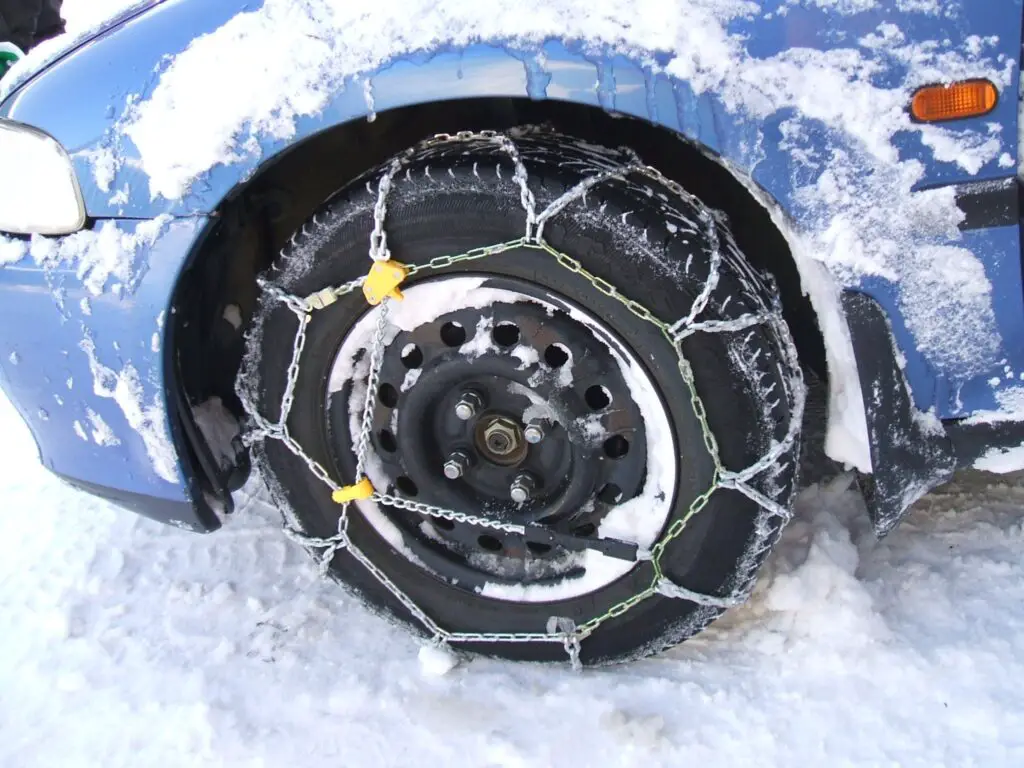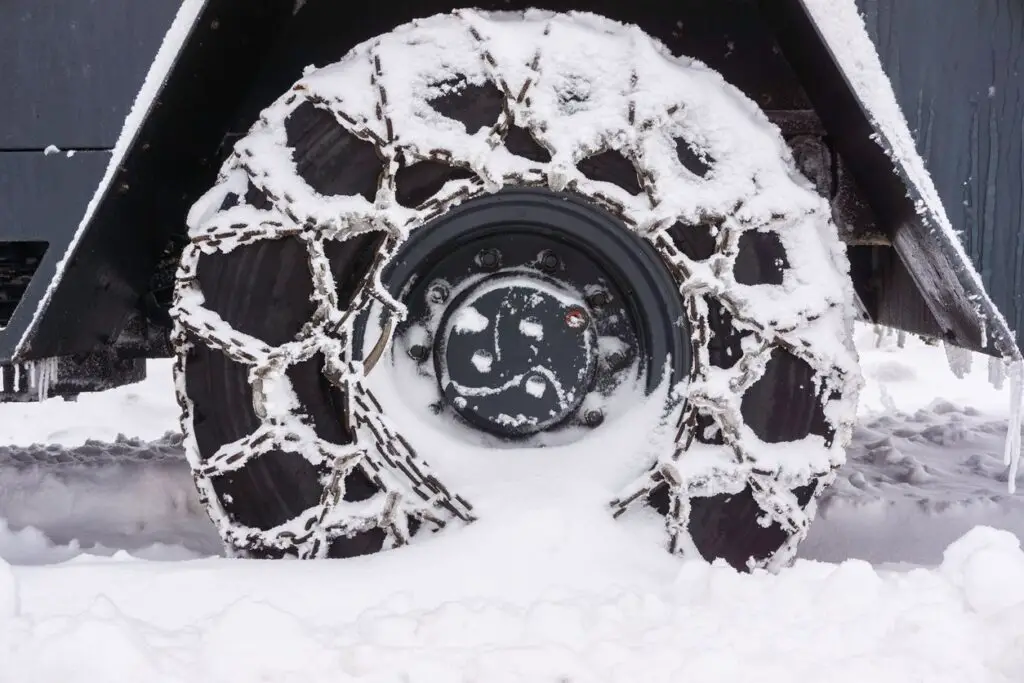Colorado requires snow chains or traction devices during winter storms, especially on I-70. Rules vary for passenger and commercial vehicles, with fines for non-compliance to ensure safety on icy roads.
If you plan on traveling through Colorado during the winter months, you’ve likely heard about the state’s snow chain requirements. Known for its stunning mountainous terrain and heavy snowfall, Colorado has specific laws in place to ensure safety on its roads during winter storms.
This guide will break down everything you need to know about these requirements, why they’re important, and how to prepare for your journey through the Rockies.

Contents
Why Are Snow Chain Requirements Necessary?
Colorado’s snow chain laws are essential for maintaining road safety during winter storms. The state experiences extreme winter weather, especially in higher elevations like the Rocky Mountains. Snow, ice, and steep inclines can make roads treacherous, and unprepared vehicles can quickly become hazards.
The primary goal of the snow chain requirements is to reduce accidents and ensure smooth traffic flow on critical routes. This is especially important on Interstate 70 (I-70), a vital corridor connecting Denver to popular ski destinations like Vail, Breckenridge, and Aspen. When vehicles without adequate traction block roadways, it can lead to major delays and safety risks.
Colorado’s Chain Laws
Colorado’s snow chain laws apply to both commercial and non-commercial vehicles. Here’s a breakdown of the key regulations:
1. Passenger Vehicle Traction Law
When the Colorado Department of Transportation (CDOT) enacts the Passenger Vehicle Traction Law (also known as Code 15), all passenger vehicles must meet one of the following requirements:
- Snow tires or mud/snow (M+S) tires with adequate tread depth (at least 3/16”).
- All-season tires with a minimum tread depth of 3/16”.
- Tire chains or an approved alternative traction device (like AutoSocks).
2. Commercial Vehicle Chain Law
Commercial vehicles, such as trucks and buses, must comply with stricter regulations during winter storms:
- Chain Law Level 1: All single-drive axle combination commercial vehicles must chain up. Other commercial vehicles must have snow tires or carry chains.
- Chain Law Level 2: All commercial vehicles must chain up. This is the most severe restriction and is typically enacted during blizzards or heavy snowstorms.
3. Passenger Vehicle Chain Law
In extreme conditions, the Passenger Vehicle Chain Law may be enacted. Under this law, all passenger vehicles must use chains or an alternative traction device, regardless of their tire type.
Key Routes Affected by Chain Laws
Certain highways in Colorado are more prone to snow chain requirements due to their high elevation and heavy traffic. Some of the most notable routes include:
- Interstate 70 (I-70): The most critical route for winter travel, connecting Denver to major ski resorts. The Eisenhower Tunnel and Vail Pass are common areas for chain law enforcement.
- U.S. Highway 6: Particularly at Loveland Pass, which is an alternative route when I-70 is closed.
- State Highway 82: Leading to Independence Pass, a popular but challenging mountain route.
How to Comply with Snow Chain Laws
Driving safely during Colorado’s winter months requires knowledge and preparation, especially when it comes to snow chain regulations.
1. Check the Weather and Road Conditions
Before heading out, check the latest weather forecasts and road conditions on CDOT’s website or mobile app. Look for updates on chain law enforcement in specific areas.
2. Carry the Right Equipment
Ensure you have the proper equipment for the vehicle:
- For passenger vehicles: Tire chains, AutoSocks, or snow-rated tires.
- For commercial vehicles: Chains for drive axles and additional chains if required for trailers.
3. Know How to Install Chains
Practice installing tire chains before you need them. Many drivers wait until they’re stuck in bad weather, which can be dangerous and stressful.
4. Follow Signage and Enforcement
Pay attention to roadside signage indicating when chain laws are in effect. Law enforcement officers and CDOT personnel often monitor compliance, and violations can result in hefty fines.
Penalties for Non-Compliance
Failing to comply with Colorado’s snow chain laws can lead to serious consequences:
- Fines: Drivers who disobey chain laws can face fines starting at $100 for basic violations. If your vehicle blocks the roadway due to insufficient traction, fines can escalate to $500 or more.
- Safety Risks: Beyond legal penalties, non-compliance puts you and other drivers at risk. A lack of traction can lead to accidents, injuries, or being stranded in dangerous conditions.

Tips for Winter Driving in Colorado
Winter driving in Colorado presents unique challenges due to snow, ice, and mountainous terrain. Here are some practical tips to ensure safety:
- Plan Ahead: Monitor weather forecasts and avoid traveling during severe storms if possible.
- Maintain Your Vehicle: Ensure your tires, brakes, and windshield wipers are in good condition.
- Carry Emergency Supplies: Pack essentials like a flashlight, blanket, water, snacks, and a first-aid kit.
- Drive Cautiously: Reduce your speed, increase your following distance, and avoid sudden braking or sharp turns.
- Use Rest Stops: Take breaks at rest areas to avoid fatigue, especially during long trips.
Frequently Asked Questions
Here are some FAQs about colorado snow chain requirement –
1. When are snow chain laws typically enforced in Colorado?
Snow chain laws are usually enforced during winter storms, primarily between October and April. The exact timing depends on weather conditions and elevation.
2. Do all-wheel-drive (AWD) vehicles need chains?
AWD vehicles are generally exempt from chain requirements if they have snow-rated tires with adequate tread depth. However, in extreme conditions, even AWD vehicles may need chains.
3. What are AutoSocks, and are they legal in Colorado?
AutoSocks are fabric-based traction devices that provide grip on snowy or icy roads. They are an approved alternative to tire chains in Colorado.
4. Can I rent chains if I don’t own any?
Yes, many rental car companies and outdoor stores in Colorado offer snow chain rentals. It’s a good idea to confirm availability in advance.
5. What happens if I’m caught without chains during a chain law enforcement?
You could face fines ranging from $100 to $500, depending on the severity of the violation. Additionally, if your vehicle blocks traffic, you may be held responsible for towing costs.
Conclusion
Colorado’s snow chain requirements are in place to protect drivers and ensure safe travel during the winter months. By knowing the laws, preparing the vehicle, and staying informed about road conditions, you can navigate Colorado’s snowy roads with confidence. Whether you’re heading to the slopes or simply passing through, compliance with these regulations will help keep you and others safe during the journey.